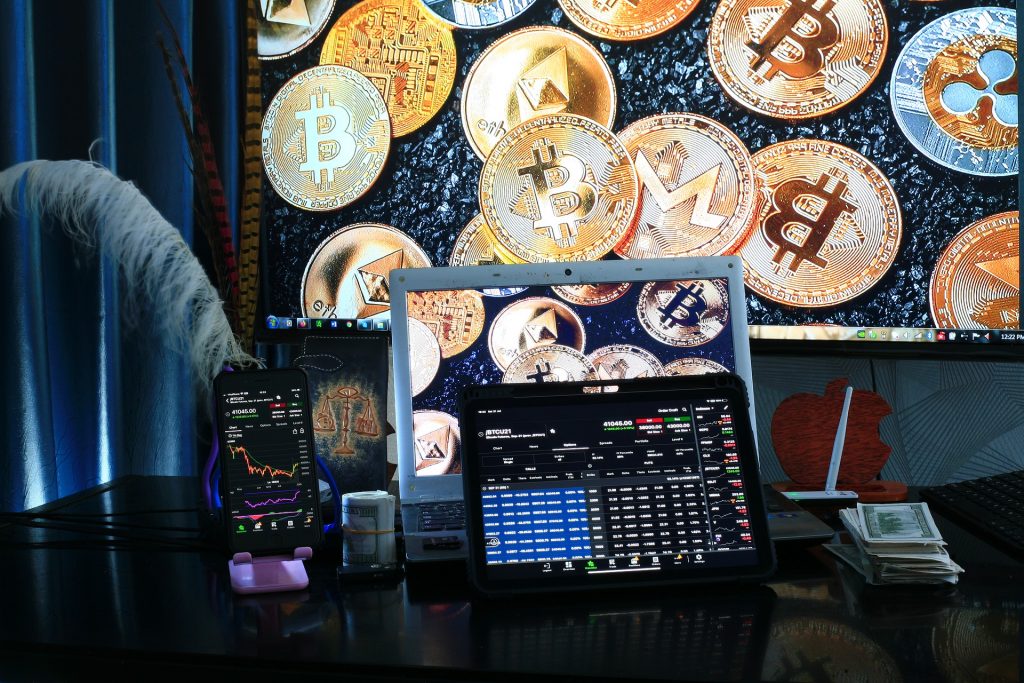You already know this: Bitcoin is the granddaddy of crypto.
It first arrived way back in 2009.
Since then, you’ve seen Bitcoin appear in numerous news headlines, stirring up both fascination and controversy.
Source: Image generated by OpenAI’s DALL-E
Enthusiasts like to call Bitcoin ‘digital gold’. And why not? It does share some similarities with physical gold:
- You see, the total supply of Bitcoin is capped at 21 million tokens. This is designed to mimic the finite quantity of gold on Earth. Also, Bitcoin operates on a decentralised blockchain network. In theory, this means that the digital token is not controlled by any single government or central bank.
- Of course, this makes Bitcoin incredibly appealing for anarchists and libertarians. They distrust mainstream institutions — so they believe Bitcoin will offer them the freedom to trade and speculate as they please.
- So, you can think of Bitcoin as being like a digital Silk Road. It’s an untamed frontier. Pretty much as close to laissez-faire capitalism as you can get. There is no regulation here. No compliance. No compromise.
- This makes Bitcoin very volatile, with wild price swings — but it also makes it very attractive for people with a rebellious streak who want to ‘smash the system‘.
So, right now, here’s the big picture. The global cryptocurrency market is currently valued at over $1.5 trillion:
- Within this environment, Bitcoin is valued at over $770 billion. This means that Bitcoin controls over half the marketplace. This makes it the single largest player around. Pretty formidable.
- But hold on. There’s more to this story. While Bitcoin continues to get all the media attention, you shouldn’t forget about the second-largest player in the crypto market: Ethereum. It’s currently valued at over $270 billion, and it appears to be growing quickly.
Source: Image generated by OpenAI’s DALL-E
If Bitcoin is known as ‘digital gold’, then Ethereum is known as ‘digital silver’. Here’s why it matters:
- While Bitcoin has remained mostly static as a digital currency, Ethereum is quite different. It’s more fluid. More organic. More versatile.
- Since appearing in 2015, Ethereum has continuously evolved. Its blockchain platform is flexible. This allows programmers to upgrade and refine Ethereum with smart contracts and decentralised-finance applications.
- One major innovation here has been the rise of non-fungible tokens (NFTs). These serve as unique fingerprints — or DNA — that can be applied to everything from artwork to real estate to animals. NFTs might serve as unique identifiers, providing a certificate of authenticity, as well as proving legal ownership.
- Does all this sound complicated? Well, here’s my best explanation in plain English: Bitcoin is used mostly as a digital store of value, while Ethereum is used mostly to build digital-banking infrastructure. Hence, the difference between ‘digital gold’ and ‘digital silver’.
Of course, it’s worth mentioning that the journey for both Bitcoin and Ethereum hasn’t been smooth. In fact, both tokens experienced a severe drawdown in 2022. From peak to through, they plunged over 70% in value:
- This happened because we experienced the sharpest rise in interest rates since 1988. As central banks tightened up on monetary policy, risky assets fell out of favour as fearful investors dumped them en masse.
- To add salt to the wound, cryptocurrency exchanges like FTX, Celsius, and Voyager collapsed like dominos, one after the other. This event was known as ‘crypto winter’. Over $2 trillion was reportedly lost in the panic.
- However, the market eventually bottomed out. Crypto survived. 2023 became the year of recovery, with the market making a decent rebound. And now in 2024 — with central banks around the world expected to make 152 interest-rate cuts — it’s possible that the risk appetite for crypto may be gaining strength.
- At the moment, it’s not just the anarchists and libertarians who are embracing crypto. Even mainstream financial institutions like BlackRock, Fidelity, and Invesco are showing interest in this area.
- Still, make no mistake about it: Bitcoin and Ethereum remain volatile. Wild price swings are inevitable. Nonetheless, should investors with a tolerance for uncertainty take a closer look at these crypto tokens?
Your first Quantum Wealth Report is waiting for you:
